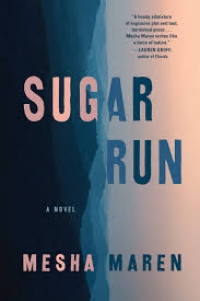Sugar Run by Mesha Maren
 Friday, June 7, 2019 at 7:34AM
Friday, June 7, 2019 at 7:34AM 
Published by Algonquin on January 8, 2019
Desperate people are still people. People who think of themselves as losers are still people. Those are among the lessons of Sugar Run, a novel of desperate people who seem destined to end up on the losing side of any conflict. For all the bad choices they make, the key characters in Sugar Run are the kind of people who would make good choices if they realized that they are not constrained by their pasts.
Jodi McCarty was a juvenile tried as an adult. After serving 18 years, she is unexpectedly released from a life sentence. Jodi hops on a Greyhound to southern Georgia to see Ricky Dulett. In the town where she thinks Ricky lives, Jodi meets Miranda Matheson, who has an on-and-off relationship with her baby’s daddy, Lee Golden, a redneck singer who performs at county fairs, having lost the rights to the songs that once gave him modest fame.
The plot involving Jodi, Miranda, and Ricky takes place in 2007. It alternates with scenes from 1988, when Jodi met a poker player named Paula, a woman who lives for a sweet run of cards, the sugar run that keeps gamblers coming back to the table. Their time together is a blur of drugs and highways — they have a Thelma and Louise approach to life — but Jodi and Paula promised to one day come back for Ricky, to take him away from the father who beats him. The reader eventually learns of Paula’s tragic past and her connection to Ricky.
In the 2007 story, we learn that Ricky has a dark side but is capable of surprising compassion, and that Jodi’s brother Dennis is a low-key drug dealer whose manipulative nature doesn’t stop him from occasionally behaving as a caring human being. Both characters create conflict in Jodi’s life, as does her desire to get back the family land that was auctioned to pay a tax debt while Jodi was in prison. Fracking is destroying the mountain around her, but fracking might be a metaphor for all the destruction that surrounds Jodi.
A number of subplots drive both stories forward, although the key question is whether Miranda and Jodi have a future together. They enjoy sleeping together, but hiding out with Miranda’s kids is stressful, and Jodi wonders whether Miranda still has a thing for Lee. She also wonders whether Miranda will lose her kids if the locals find out that she and Miranda are engaging in acts that the locals would regard as sinful.
Mesha Maren waits until near the novel’s end to reveal Jodi’s crime. That’s wise because, as in real life, after we come to like someone, it is difficult to unlike them because of a single bad act, at least if the act is directed at someone else.
To the extent that Sugar Run is a domestic drama, Jodi’s relationships are so unconventional that they never veer into soap opera territory. Local politics provides atmosphere, as environmentalists who oppose fracking are in conflict with people whose jobs depend on ruining water supplies.
Mesha Maren’s prose contributes the novel’s success. Here’s how she sets a scene: “Jodi couldn’t quite place their faces or remember specific names but she knew these women well. They’d always been there in the background with coffee and sticky, starchy foods. At the scene of every disaster and celebration they’d fill out the edges of the room with their pillowy housedresses and clouds of smoke. By the very generosity of their bodies they comforted the children and men.”
Sugar Run suggests that our lives have patterns and that, once made, an old pattern will easily shape a new life. Yet the story also suggests the possibility of gaining the strength and courage to break a bad pattern. There is always more to life if you make the effort to find it. Or perhaps the novel teaches that when you’ve hit bottom, there is nowhere to look but up. Regardless of what a reader might take from the novel, I suspect that most readers will find something worth taking.
RECOMMENDED